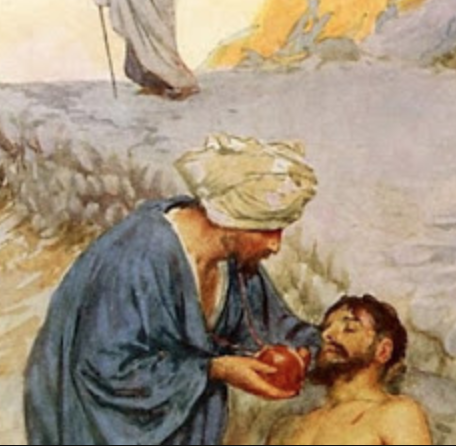Social Justice, the Good Samaritan and Outsourcing Charity

One of the most common arguments I hear against “social justice” is this:
Many Christians believe the Gospel calls us to get personally involved in doing charity. They argue that we shouldn’t work to improve economic and political systems because that would be outsourcing our Christian responsibilities to a third party, such as the government. For example, they would say Jesus calls us to personally feed the hungry (Matthew 25:31-46), not to pay taxes so that the government can do that for us.
The story of the Good Samaritan (Luke 10:25-37) shows why this is false.
As you know from the story, Jesus himself holds up the Good Samaritan as a model of a “good neighbor.” The Good Samaritan helped the injured man he found on the side of the road. Indeed, he took personal responsibility to provide personal care for this man. No question about it.
The Samaritan “took pity,” so he was emotionally involved. He provided immediate triage of the man’s wounds using his own wine and oils. He helped transport him using his own donkey.
But that wasn’t all he did.
Remember that the Good Samaritan was a busy man who was in the middle of some business of his own. What did he do? He paid an innkeeper to take care of this man during a period of time when the Samaritan could not be there himself. However, he promised to watch over this process and to return to make sure this work had been done to his specifications.
Jesus does call each of us to be personally involved, no question about that. Christian charity as Christ describes it is not the kind where we simply write a check and forget about it. Rather, we are to get viscerally involved on every level of our being. The parable tell us that there are many ways in which to do that.
The Good Samaritan continued to be personally involved even when he solicited the help of another person in this work. The Good Samaritan was wise to involve the innkeeper who had the time and skills to provide what he couldn’t. However, the Good Samaritan didn’t “check out” by writing a check. Rather, he continued to be very much involved.
The Role of the Government
Many people misunderstand the role of governments in this way. They consider the government to be the “nanny state” which has taken our personal involvement away from us. Therefore they believe it is “more Christian” to do things on our own rather than involve the government. However, that is not a fair understanding of the government. Yes, we are indeed called to be personally responsible and be our brother’s keeper. Just like the Good Samaritan, people may choose to exercise their personal responsibility by working together as a collective group or by hiring experts at strategic points. They stay attentive to the process to make sure the work gets done. An active, engaged citizen in a democracy has in no way diminished her level of personal responsibility to the “nanny state.” She’s going to personally elect representatives and then watch over them like a hawk to make sure they do the job they were elected to do.
I have never seen any moral difference between helping others as individuals, as a family, as a church community or as a whole society using the resources of the government. The only difference is the scale–and that is the point. The government has a reach that no other organization has. It is simply the best tool for some jobs. To not use that tool would be irresponsible if that tool were the best one to get the job done.
For example, if my neighbor falls off his roof, I will personally make sure he gets medical care. However, I will not be the one providing that care. Instead, I will take him to the hospital. I am definitely personally involved, but I am not going to directly attempt to provide medical care–that would be dangerous since I don’t have medical training. But I CAN be an advocate and make sure he gets to the hospital and gets the right people working on him. As you can see, there are times when involving others who have more skills than ourselves may be the more responsible–and yes, more Christian–thing to do than simply doing it ourselves.
That’s what the Good Samaritan did. Because he didn’t have the time, skills or resources (or a combination of all of these), he chose to involve the innkeeper. And remember: Jesus holds up the Good Samaritan as a model of a good neighbor.
Likewise, when we work together with our fellow citizens to solve a problem together as a whole group rather than as isolated individuals, it may not simply be an option, it may actually be the most responsible thing to do from a Christian standpoint.
Visit Frank Lesko’s website here.

